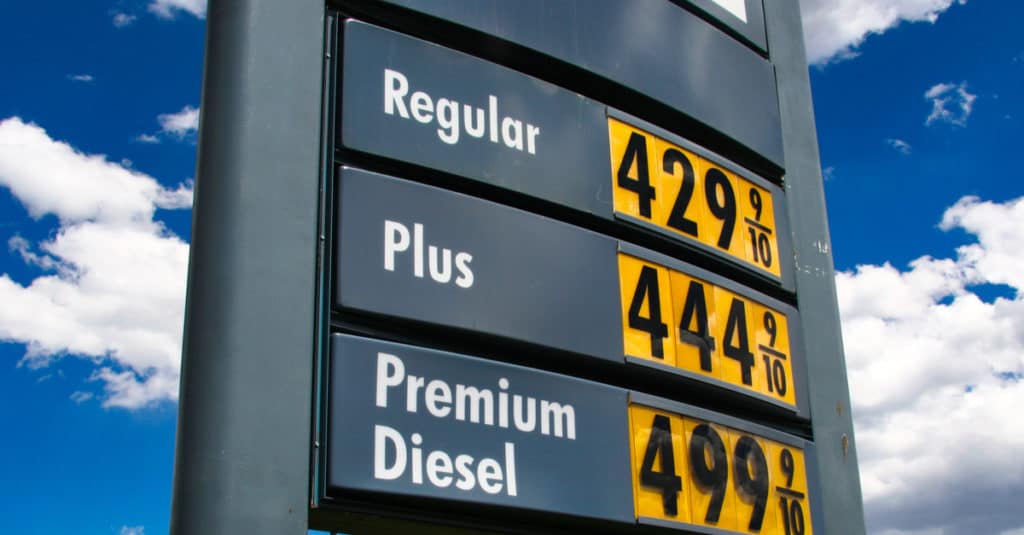With gas prices averaging $4.18 a gallon across the U.S. and a price hike from summer blends looming, more than 72% of Americans have already had to make some tough financial choices due to the extra expense.
The past few months have been difficult. According to Gas Buddy, fuel costs jumped more than 20% in early March, and though they’ve since receded a bit, it’s no help that overall inflation hit its highest level in 40 years, leading to financial strain for many of us. Adding to the pressure, employers have begun requiring workers to return to the office, only for them to find that their weekly commute costs significantly more.
On May 1, many states will start to see a 15-cent-per-gallon price hike as states switch over to more expensive summer blends. How much impact are these soaring prices having on Americans’ daily spending and lifestyle habits? DebtHammer.org set out to learn.
We polled 530 Americans to determine the impact of rising gas prices on our daily spending and lifestyle habits. Here’s what we found out:
Table of Contents
Key takeaways
It’s blowing our budgets: More than 25% said they’re either accruing debt or can’t afford to pay a bill because of the extra money they’re spending on gas. Another 44% said they’ve had to curtail other activities to offset the additional expense.
We’re changing our driving habits: More than 50% said gas prices between $3.50 to $4.25 per gallon triggered daily changes. This primarily means buying fewer restaurant meals, condensing errands into one longer trip and cutting back on entertainment.
We still aren’t turning to public transportation: Despite the budget crunches and belt-tightening, only 12% are switching to a bus, subway or light rail for transportation, and 8% are riding bikes. About 23% have said they’ll walk more, and 14% will carpool, but only 3% plan to start utilizing school buses to get the kids to school.
Other key findings
Some of us are pretty stressed: 36% say stress over gas prices keeps them awake at night.
Summer travel is back: 58% of Americans are planning to take a summer vacation this year, though 37% will stay closer to home and 25% have said they’ll fly instead of drive.
We prefer to work from home: 26% said they’d prefer to work from home until gas prices stabilize, and 38% said they’d save more than $50 a week by dropping their commute. Another 40% said they’d save between $25 to $50 per month.
Workplaces aren’t changing plans: 47% said that despite the soaring gas prices, their employers are moving ahead with plans to return to the office. Only 14% of employers are considering extending remote work or switching to a hybrid schedule.
For some, the commute can be a deal-breaker: 19% of Americans said they’ll look for a new job if gas prices remain high and their employer forces them to commute five days a week.
We like a bargain: About 60% have said they use strategies to try to save a few extra cents at the pump. These include utilizing warehouse club prices and accumulating grocery store fuel points.
Methodology
DebtHammer collected survey responses from a random sample of more than 530 adults aged 18 or older via SurveyMonkey and Reddit from March 25 to April 4. All respondents live in the United States. Each response was anonymized using a unique user ID.
Of those we surveyed, 54% were female, 45% were male, and 1% identified as either non-binary/other or preferred not to say. About 22% of respondents were aged 18 to 29, 28% were aged 30 to 44, 27% were between ages 45 to 60 and 23% were over the age of 60.
The bottom line
Many factors lead to gas-price fluctuations, so it’s impossible to know for certain when prices will stabilize. In the meantime, there are a few strategies to help combat the rising prices. These include utilizing public transit, taking advantage of technology that can help you find the lowest prices in your area, and either bunching errands into one trip or tacking them onto your commute.
The most important step is to recognize when your fuel spending is exceeding your weekly or monthly budget, and proactively scale back your spending in other areas as much as possible to avoid taking on additional debt. You don’t want to be left paying a high price even after gas prices eventually decline.
The professors weigh in
What’s the one piece of advice you’d give to anyone struggling to afford the higher gas prices?

Dr. John Hilston
Professor of Economics/History/Business at Eastern Florida State College
This too shall pass! That said, it could also happen again. If possible, it would be wise to consider acquiring a more fuel-efficient vehicle. I would note that this is practical advice for someone struggling to afford the higher prices. It is not a political statement, nor is it “preaching”. I believe we should all have freedom of choice and respect each other’s choices (even if we disagree with some of those choices). That said, we must also bear the consequences of those choices.

Dr. Dorothy Kelly
Personal Finance Lecturer at University of Virginia McIntire School of Commerce
Unfortunately, there is no silver bullet or one piece of advice that will solve the problem for those struggling to afford higher gas prices.
If high gas prices are squeezing your budget, consolidate trips, car pool with friends and colleagues, and use public transportation if/when available. Also, read tips for maximizing your vehicle’s fuel efficiency. Every little bit helps, so make an effort to do every little thing, like checking your tire pressure, and reducing extra weight in your vehicle.
Also, realize that some vehicles are much more fuel efficient than others. I always recommend buying fuel-efficient vehicles–even when the price of gas is low. If/when gas prices decline, take the savings and put it into savings rather than using it to enhance your lifestyle or current consumption. Gas prices were very low during the pandemic, those who saved and/or invested the savings from the pump are finding today’s gas prices to be less problematic than those who did not.
The real lesson is that we each need to be our own advocate, take control of our finances, and plan and save for rainy days (such as pandemics or periods of high inflation). Making smart choices about how we spend our money in good economic times makes it easier to weather the tough economic times.

Dr. Stefano Mazzotta
Professor of Economics and Finance at Kennesaw State University
Avoid driving, if not necessary. If possible, telecommute, or carpool. Take a hard look at your driving habits. Drive gently, accelerate slowly, anticipate traffic, and coast to decelerate. Use brakes the least possible within safety standard. It saves gas and mechanic fees. Use the lowest octane gas that your manufacturer recommends. If or when you are in the market for a vehicle, prioritize fuel efficiency. It’s the right thing to do for your wallet and for the environment.
What steps, in your opinion, can people take to help them stay within budget despite the rising prices at the pump?

Dr. Priscilla Murolo
Senior member of the history faculty at Sarah Lawrence College and author of The Common Ground of Womanhood: Class, Gender, and Working Girls’ Clubs.
I think the best step people can take to cope with rising prices and build savings is to unionize their workplaces. There are short-term fixes such as making do with a peanut-butter sandwich for lunch or walking instead of taking the bus, but the only thing that works over the long haul is to unite with others to bargain for higher earnings and better fringe benefits. In unity there is strength.
Dr: Hilston:
The GasBuddy app is helpful in steering clear of higher prices (or steering towards lower prices). For some, it may be helpful to plan errands so that one might optimize the route for fuel efficiency. Carpooling might be an option for some folks, too.
Dr. Mazzotta:
In the current inflationary environment this is difficult because along with gas many other prices are going up. In these times it makes sense to review the budget in its entirety and cut the fat. It is a good exercise to take a couple of credit card statements, look at each item and decide if the associate expense is indispensable or it can be avoided or substituted with an equally effective but less expensive choice. Reducing recurring expenses should be top priority.
What’s the most important piece of advice you have to help Americans build savings?
Dr. Hilston:
Despite inflation, pennies matter. If one looks out for their “pennies” via careful budgeting, the dollars will take care of themselves. To make sure that saving actually happens, sign up to automatically draft savings dollars from your checking account (to the destination savings or investment account). Be aggressive when you’re younger – you have time to recover from short term downturns. And be a little more conservative (bonds even?) when you have more of a nest egg.
Dr. Kelly:
I recommend the 20-50-30 budget. First, apply a minimum of 20% of after-tax pay to your financial priorities. That could be paying down debt, contributing to a retirement account, and/or saving for a house or a child’s education. Next, spend no more than 50% on your living essentials including housing, transportation, food, utilities, and insurance. Finally, spend no more than 30% on everything else—lifestyle such as entertainment, travel, subscriptions, electronics, dining, memberships, fashion, salons, etc.
Once you have an emergency fund of 6 to 9 months of living expenses set aside, I recommend investing for your future using low-cost, well-diversified index funds, preferably through an employer-sponsored retirement plan such as a 401(k).

